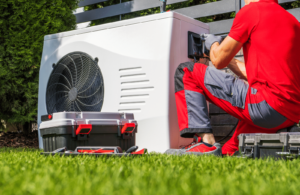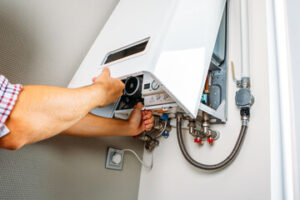HVAC Lexington KY costs vary depending on the type of system and local labor rates. Some things, like age, impact repair costs more than others, such as replacing obsolete or hard-to-find parts.
Working in the HVAC industry can be a busy, hands-on job during the hottest summer days. Often, technicians are on call to handle emergency repairs.

Dirty air filters are among the most common causes of HVAC system problems. Dirty filters restrict the air that passes through the coils and furnace plenum, forcing the system to work harder. The extra strain on the system can cause several issues that impact your home, including higher energy bills and reduced indoor air quality.
The evaporator coil in your indoor unit is where the refrigerant evaporates as the cooling process takes place, and this coil can become caked with dirt, dust, and other debris that the air filter would normally trap. This buildup makes it hard for the coil to absorb heat from the air passing over it, and this can cause the coil to freeze.
A frozen evaporator coil is an issue that needs to be dealt with as soon as possible because it can prevent your AC from working properly and can cause water leaks in the home. The best way to deal with this is by calling a professional right away since trying to thaw the coil on your own could lead to injury or further damage to the unit.
Frozen coils also impact the unit’s ability to maintain indoor climate control, causing it to use more energy in an attempt to keep up. This can result in higher energy bills and may also cause the unit to overheat, requiring a replacement part or even an entire system replacement.
If you continue to ignore air filter maintenance, the buildup of dirt in your system can eventually cause the blower motor to burn out, which will require expensive repairs or a new compressor and blower assembly. Additionally, a dirty air filter can affect your home’s energy efficiency rating, which can reduce your tax credits and rebates for home energy usage and increase the amount of money you will have to spend on home repairs and renovations.
Keeping your air filter clean is an easy and inexpensive way to help extend the life of your system and ensure that it is running as efficiently as possible. Contact an HVAC company for a professional air duct cleaning and replace your air filter on a regular basis to avoid the most common HVAC repair issues.
Whether caused by severe weather or even lightning strikes, power outages are a common occurrence that often leaves residents without any way to run their appliances and equipment. But if you notice that your HVAC system doesn’t turn back on after the electricity returns, there may be some simple reasons why it’s not working.
In many cases, your AC system is simply not turning on because it’s unable to process the amount of electricity being supplied to it. A blown fuse, overheated compressor, or faulty thermostat are some of the most common electrical issues that can prevent your unit from starting up.
While a blown fuse or overheated compressor are more serious issues that need to be addressed by an experienced HVAC technician, it’s not uncommon for them to occur due to an outage. Regardless of the reason for the power outage, if your system fails to start up after the power returns, it’s important to check your circuit breakers and reset any that have tripped.
Start by locating your breaker box, which can be found in attics, hallways, laundry rooms, or garages. Inside the breaker box, you should find several switches with labels that indicate what each one controls. Often, there will be a switch for the furnace and one for the air conditioner. Identify these switches and find any that are set to “OFF” or have a color indicator indicating that they have tripped. If any of these have tripped, switch them to the ON position and wait 30 minutes before trying to restart your system again.
If your AC doesn’t turn on after resetting the breakers, it’s likely that there is more serious damage caused by the surge of electricity when the power returned. A trusted HVAC technician will be able to determine the cause of this and make any necessary repairs.
Remember that electricity is dangerous and can injure or kill people who don’t know how to properly handle it. Be sure to leave all electrical problems to an experienced technician, who will have the proper personal protection and safety gear to ensure your safety and the integrity of your HVAC system.
The components that make up an HVAC system are prone to damage from outside elements such as wind, hail or extreme temperatures. The internal components can also suffer damage due to neglect and poor maintenance practices. When a component is damaged, it can impact the efficiency of the entire system and contribute to higher energy bills.
Among the most common problems faced by homeowners is a damaged control board. The board controls the functions of the HVAC and communicates with the thermostat to regulate temperatures. If the control board is damaged, the entire HVAC system will fail to activate and won’t cool your home.
Other common HVAC repair issues include a broken blower motor or fan belt, a clogged air filter and ductwork damage. Homeowners should regularly check their HVAC systems for signs of damage and schedule professional preventative maintenance to protect against costly repairs or a complete system breakdown.
It’s also important to check for signs of smoke or fire damage. For example, if a furnace or air conditioner is exposed to flames, soot and smoke, it could damage the internal components, leading to the need for a costly replacement. A skilled insurance adjuster will be able to help you determine what type of damage your HVAC system has suffered and provide accurate claims handling and repair recommendations.
Leaking ductwork is another common problem that can lead to inefficient operation and high energy costs. The ducts must be properly sealed to ensure that the conditioned air is delivered evenly throughout the house. During maintenance visits, HVAC technicians can inspect ductwork for leaking sections, broken connections, crushed or collapsed ducts and other signs of wear and tear. Repairing or replacing these components can improve airflow, energy efficiency and indoor air quality.
Performing regular maintenance on an HVAC system can help keep it working efficiently for years to come. However, even with the best preventative measures, it’s essential for homeowners to watch their energy usage and compare it to previous months or years to identify potential issues. This will promote a more energy-conscious household and can help reduce utility bills.
The thermostat is the brain of your HVAC system, so if it starts to act up, your entire system will suffer. While the thermostat itself is fairly simple and hardly ever breaks down entirely, it can develop issues that affect your HVAC system’s functionality and performance.
If you’re noticing your home’s temperature changing frequently or your HVAC system running continuously but not producing cool air, you may need to call an HVAC technician for assistance. These issues could be signs that there are thermostat issues with your heating and cooling systems.
One of the most common thermostat problems is that it won’t turn on the air conditioner or furnace. A simple solution is to change the batteries or check the circuit breaker in your home’s breaker box. However, the problem might be more serious and involve the thermostat itself.
A broken or malfunctioning thermostat can be difficult to diagnose without a professional. You can try to troubleshoot the problem by lowering its settings and monitoring the results. If the thermostat still changes its settings at random, it may be experiencing a more severe problem and need to be replaced or repaired.
Thermostats can also lose their ability to send the correct signals to the HVAC system if they’re not properly installed or leveled. This can be caused by an improper voltage match or a loose wire. Working around electrical components can be dangerous, so it’s best to let a professional handle the repairs and installation for you.
Another thermostat issue is that it doesn’t read indoor temperatures correctly, which causes the air conditioning to produce colder or warmer air than what the homeowner wants. You can check this by using a handheld ambient air thermometer and comparing it to the reading on your thermostat. If you notice your house is not comfortable, it may be time to replace your thermostat. An HVAC technician will be able to help you find the right thermostat for your needs and install it correctly. They can also advise you on ductwork modifications to improve airflow. This will increase your comfort levels and save you money on energy bills in the long run.
